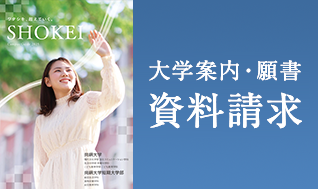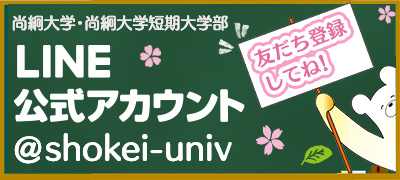Faculty of Contemporary Culture, Department of Cultural Communication

Students acquire knowledge related to advanced Japanese language usage and diverse cultures and societies, and are trained to contribute to Japanese society, which is presently advancing both in terms of information technology and globalization.
A special feature of these studies is that two subjects can be combined out of the four areas of information media culture, tourism culture, Japanese and South East Asian society culture, and literary arts culture, in line with the student’s interests and desired career or study path. With this, students can cultivate specialist cultural skills. Also, we use teamwork to nurture the ability to solve problems cooperatively, the ability of Japanese language usage that forms the base of all the learning, and the ability to use foreign languages practically.
Obtainable qualifications include Social Investigator, Presentation Professional, Tourism Business Professional, Librarian, and Japanese Teacher (certified by this school).
- 4 years
- April 2018
- 75
- 300
- 19
- Literary Arts Studies, Visual Expression, South Korean Social Culture, Contents Tourism, etc.
Faculty of Human Life Science, Department of Nutritional Science

We train students to become national registered dieticians that are highly specialized in a diverse range of practical skills.
The nurturing of national registered dieticians is the main focus of the Department of Nutritional Science. Specifically, this means becoming a dietician who plays an active role in the fields of health, hygiene, medical treatment, and welfare and nursing care, and who possesses high-level specialist knowledge and skills for handling the health issues of the nation’s people, such as lifestyle-related diseases.
National registered dieticians who conduct food guidance for patients in hospitals are able to get remuneration for medical services, and cooperation with doctors and nurses as a member of the “nutrition support team” is especially valued, we aim to train dieticians who have cooperative skills necessary for collaboration and team work with other professions. Furthermore, we also aim to cultivate personnel engaged in food quality control and research and development in a variety of workplaces.
In addition, from FY2005 a nutrition teacher system was set up in the course to integrally control and guide the preparation of school meals. Through this we are putting efforts into cultivating nutrition teachers who bear a central role in forming the eating habits desired by children and students, and the course allows students to gain a first-class nutrition teaching license.
- 4 years
- 326
- 15
- medical treatment, welfare (Kitakyushu Hospital, Sakura Jyuji Hospital, Kanakogi-en Long-Term Care Health Facilities, etc), civil servant (Omuta City Hall, Taragi Town Hall), manufacturing industry (Ryoyu Co. Ltd., Kaneryo Kaiso Co. Ltd., etc), wholesale and retail industries (Howdy Inc. Co., Ltd.), accommodation and catering industries (LEOC Co., Ltd. catering company, etc), and education and learning-support industries (Arao Kaiyo Municipal Middle School, etc).
- Details of Nutritional Science, Microbiology, Biochemistry Experiments
Junior College, Department of Integrated Career Studies

Students learn medical treatment work, information business, wellness in welfare, and human life design, and are nurtured into members of society with practical skills. Specifically, areas related to computer and information processing, health and welfare, interior, apparel, bridal and food education - subjects crucial to living in contemporary society - can be widely studied by students.
Also, by gaining qualifications in a wide range of fields useful for job-hunting – such as data processor, certificate of new nursing staff training program, secretary, medical secretary, and recreation instructor – students can acquire specialized knowledge and practical skills for becoming active women in society.
- 2 years
- 118
- 7
- civil servant (Kumamoto Prefectural Police, Yatsushiro City Hall, etc), medical office worker (Kumamoto City Hospital, Saiseikai Kumamoto Hospital, etc), office clerk (Higo Bank, Japan Post Holdings, JR Kyushu, Toyota Corolla Kumamoto Co., Ltd., etc), service industry (Seven-Eleven Japan Co., Ltd., etc), business and sales industries (Meiji Yasuda Life Insurance Company, Sumitomo Life Insurance Company, etc), and nursing industries (Riddell Wright Home social welfare corporation, etc).
- Business Manners, Welfare Support, Interior Practice, Apparel Design
Junior College, Department of Food and Nutrition

The keywords of the Department of Nutritional Science are “food, nutrition, and health”, and through compiling and carrying out an effective curriculum aimed at having students acquire a nutritionist qualification, we are devoting ourselves into nurturing nutritionists with both wisdom and virtue and who are bastions of good health. Graduates of this course grow to have both consideration for others and a sense of responsibility, and go out into the world as nutritionists who’ve acquired knowledge, techniques, and skills that allow them to be active in society straight away. Many nutritionists working in the prefecture are graduates of this school and are active in many fields, such as hospitals, childcare centers, schools, and welfare facilities.
In addition, students are able to transfer to the University’s Faculty of Human Life Science’s Department of Nutritional Science (there’s a quota for those recommended from Department of Food and Nutrition) to aim to become a national registered dietician.
- 2 years
- 127
- 8
- medical treatment and welfare (Yutaka Gakuen, Meihoukai Vira Nagamine social welfare corporation, Kikusui Gakuen child and family services, etc), service industry (Kyushu Food Supply Centre Co., Ltd., Toshin Co., Ltd., Nissin Healthcare Food Service Co., Ltd, Minami-Kyushu Branch), and higher education (Shokei College Faculty of Human Life Science, Nakamura Gakuen University, etc).
- Gastrology, Exercise and Nutrition, Nutritional Guidance, Food Services Practicum (practicing outside of school)
Junior College, Department of Childhood Education

Through close ties with childcare facilities we cultivate student’s practical skills as childcare teachers.
We deepen understanding of the minds of children, their play, growth and health. We develop the practical abilities of childcare teachers so they can teach children ways of living and playing that are healthy and enriching, and we aim to train kindergarten and childcare teachers who are rich in humanity.
Within the short-term concentrated two-year learning period we aim for almost all students to acquire qualifications, and through close ties with childcare facilities every year around 96% of students who find work do so in childcare, and this high track record is something this course is renowned for. Other major distinctions of this course are the various learning techniques teachers utilize and the lively exchanges that occur among students and between students and teachers.
- 2 years
- 281, Admission capacity : 150 per year
- 300
- 17
- kindergarten teacher (Akebono Kindergarten, Musashigaoka Kindergarten, etc), nursery school teacher (Ajisai Childcare Center, Warabi Childcare Center, etc), medical treatment and welfare facilities (Seikai Kumamoto Hospital, Jiaien Baby Home, etc), and higher education institutions (Kumamoto Gakuen University, University of Teacher Education Fukuoka, etc).
- Social Care I, Infant Care, Child Care and Teaching Practicum





